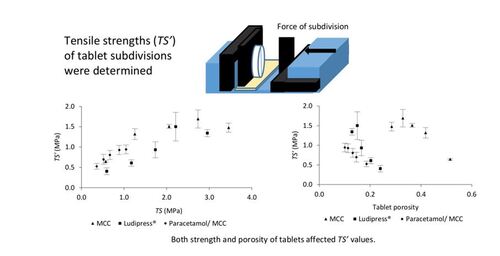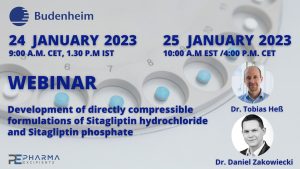Effect of Strength and Porosity of Tablets on the Magnitudes of Subdivision Forces

In this study, a hardness tester was modified by attaching a metal blade to its testing area to obtain the minimum forces required to subdivide tablets along their diameters (F’). Moreover, the tensile strengths of subdividing tablets (TS’) were calculated. Tablets of microcrystalline cellulose (MCC) weighing 0.5 g were produced at applied compression pressures of 21, 31, 41, 50, and 60 MPa. In addition, tablets of Ludipress®, and a 5:2 mixture of paracetamol to MCC weighing 0.7 g were produced at applied compression pressures of 77, 116, 154, 193, and 232 MPa.
It was found that F’ increased as the applied compression pressure used to produce the tablets increased until a maximum value was reached. This maximum value was at around 100 N for MCC and Ludipress® tablets and at around 76 N for paracetamol/MCC tablets. Moreover, a maximum value of TS’ was reached at a porosity of 0.37 for MCC, 0.15 for Ludipress®, and 0.11 for paracetamol/MCC tablets. The maximum TS’ values were at around 1.5 MPa for MCC and Ludipress® tablets and at around 0.9 MPa for paracetamol/MCC tablets. Therefore, both interparticulate bonding (tablet strength) and porosity (packing) affected the magnitudes of F’ and TS’.
Read more
(2023) Effect of Strength and Porosity of Tablets on the Magnitudes of Subdivision Forces, Pharmaceutical Development and Technology, DOI: 10.1080/10837450.2023.2167089
Our next webinar:
For free registration and more information click on the picture below or here:


